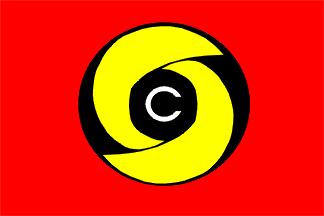
image by Jarig Bakker, 1 September 2005

Last modified: 2010-02-12 by dov gutterman
Keywords: italy | houseflag | house flag |
Links: FOTW homepage |
search |
disclaimer and copyright |
write us |
mirrors
See also:

image by Jarig Bakker, 1 September 2005
Callcestruzzi S.p.A., Ravenna - red flag, in center black
disk, charged with two crescents forming a circle, surrounding a
white "C".
Source: Brown's Flags and Funnels Shipping Companies of
the World, compiled by J.L. Loughran, Glasgow, 1995.
Jarig Bakker, 1 September 2005
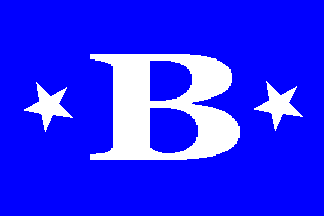
image by Ivan Sache, 2 November 2003
Gruppo Carboflotta (including Carbofin and Carbonor) is based
in Genoa. The houseflag of the company is blue with a white B
letter in the middle, flanked by two white stars. I assume B is
the initial of the name of the founder or a former owner of the
company.
Source: <www.omniainformatica.it>,
located by Jan Mertens.
Ivan Sache, 2 November 2003
This is the cable address of Union Ligure Armamento S.r.l.,
formed 1952, with their shipping subsidiary (as at Lloyds 2000)
being Carbofin S.p.A. [I have nothing on Carbonor but assume they
are another subsidiary]. The flag is that of Bibolini Societŕ di Navigazione
S.p.A. and regular sources show the stars being erect i.e. top
point straight up. There is a connection of some sort between the
companies [possibly on a chartering bases] and also likely with
other "Carbo" companies of the past but it is not
clear. The Bibolini company originated pre WW2 as Giovanni B.
Bibolini who had a blue flag bearing a white "B" only
and Brown 1958 gives this livery as applying to Unione Ligure
Armamento as well as to Transoceanica Genovese S.p.A. (latter not
traced). Bibolini ceased to be shipowners sometime between 1985
and 1992.
Neale Rosanoski, 3 January 2004
Carbonor S.p.A. now located as formed 2000 as a name
subsidiary of Carbofin S.p.A. By "name subsidiary" I
mean one for which no address is given indicating that it only
exists as a name under which ships are officially owned. Also, my
previous comment referring to "this is the cable
address" etc, would clarify better if it read as
"the website shows the cable address" etc.
Neale Rosanoski, 24 March 2004
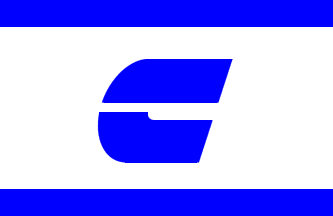
new version
image by António Martins, 28 December 2008
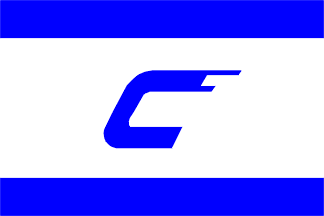
old version
image by Jarig Bakker, 1 September 2005
Soc. Campania Regionale Marittima S.p.A., (CAREMAR) Naples -
Spanish-style BWB; in center fanged blue "C".
Source: Brown's Flags and Funnels Shipping Companies of
the World, compiled by J.L. Loughran, Glasgow, 1995.
Jarig Bakker, 1 September 2005
The old and new design can be seen at <www.naviearmatori.net>.
Jan Mertens, 30 November 2008
CAREMAR is a member of the Tirrenia Group.
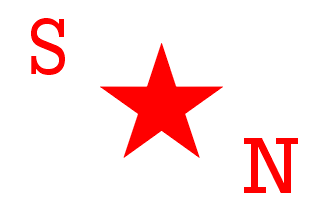
image by Jarig Bakker, 19 September 2005
Soc. Carmelo Nolifu Giovanni S.R.L., Savona - white flag; in
center red 5-pointed star; at tophoist red serifed "S",
in bottom hoist idem "N".
Source: Brown's Flags and Funnels Shipping Companies of
the World, compiled by J.L. Loughran, Glasgow, 1995.
Jarig Bakker, 19 September 2005
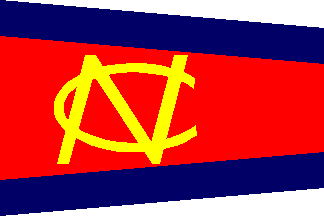
image by Jorge Candeias, 1 April 1999
A sort of a non-swallowtailed burgee, red, with dark blue
stripes along the top and bottom edges and a yellow logo shifted
to the hoist, consisting of the overlapping letters "N"
and "C".
Jorge Candeias, 1 April 1999
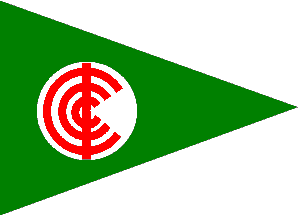
image by Jarig Bakker, 18 December 2004
C. Camuzzi E Cie; Milano - green burgee; white disk charged
with concentric "CCCI" in red.
Source: Brown's Flags and Funnels of British and Foreign
Steamship Companies, compiled by F.J.N. Wedge, Glasgow, 1926 [wed26]
Jarig Bakker, 18 December 2004
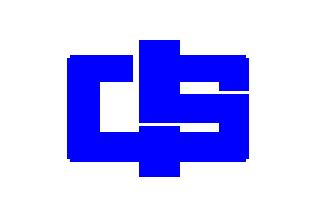
image by Dov Gutterman, 4 November 2003
From <www.finsea.it>:
"China Shipping (Italy) Agency Co. is the new
"starring" Agency in the Italian Shipping world.
Founded in the early 1999 through a joint venture between the
Shanghai giant China Shipping (Group) Co. and the Genoese fast
foregoing Finsea Holding, clustering Ship Agencies, Port Terminal
and Logistic activities, CS(I)A became operative in the autumn
same year."
The flag is blue logo on white, as seen in a photo at that page.
Dov Gutterman, 4 November 2003
Cogedar Line- Horizontal blue over red horizontal bicolor with
large white disc overall. Inside the disc a black or brown motif
relembling decorative Arabic script and above it, on the blue
area, three five-pointed upright white stars in arc.
Source: Postcard collection sent to Martin Karner
António Martins-Tuválkin, 16 June 2006
Photos at <www.rubylane.com>.
My impression: entwined capital letters in script (so this would
be 'CGA') but I could be wrong.
From <www.simplonpc.co.uk>
"Cogedar was an acronym for Compagnia Genovese di Armamento.
their first passenger ship was the Flaminia, following a rebuild
of the freighter Genova in 1954. They subsequently acquired two
further passenger ships, the Canadian Pacific Beaverbrae, and
Cunard's Media, becoming the Aurelia and Flavia respectively.
Costa Line had always had a financial interest in Cogedar, and in
1968 they took over the line completely. Aurelia was sold to
Chandris Lines, and Flavia joined the the Costa Lines
fleet." See also <paginas.terra.com.br>.
Jan Mertens, 16 June 2006
Image from <www.timetableimages.com>
also showing some background from a brochure issued around 1960.
There are the blue-red stripes and the three white stars, plus -
on the disk - a representation of St George slaying the dragon,
rendered in black and white. St George, of course, is the patron
saint of Genoa where this company was established.
Jan Mertens, 14 September 2006
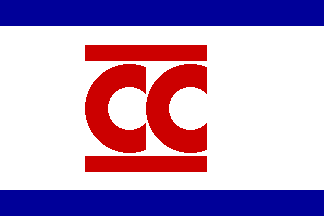
image by Jorge Candeias, 7 Febuary 1999
White with two blue horizontal stripes along the upper and
lower edges and the red logo shifted to the hoist. The logo is a
pair of "C"s limited above and below by horizontal
bars.
Jorge Candeias, 7 Febuary 1999
A real flag from from: <www.coeclerici.com>
can be seen here.
Dov Gutterman, 27 January 1999
Originated in 1909 from the partnership of Henry Coe and
Alfonso Clerici Sr. beginning shipowning in 1912. In 1985 they
operated through the newly formed subsidiary of Bulkitalia S.p.A.
which merged in 1994 with Fermar S.p.A. to form Coeclerici
Armatori S.p.A.
Neale Rosanoski, 11 April 2003
COMAG Srl. is an Italian liner agency established at Naples,
serving as Far East agents for the well-known French company
CMA-CGM since 2007. (Not to be confused with the
Italian machine manufacturer of the same name).
A tiny house flag drawing
is found at <www.omniainformatica.it>:
Orange field (well, it looks like orange compared to the red hues
on this page), white diamond touching the edges bearing blue
company name “COMAG”.
Jan Mertens, 30 July 2009
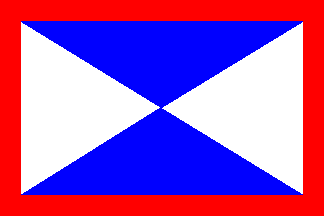
image by Ivan Sache, 29 March 2008
Lloyd's Book of House Flags and Funnels (1912) shows the house
flag of "Consorzio Piroscafo 'Sud' (E. Pollich)" (#132,
p. 43), a company based in Trieste (then in Austria-Hungary), as
divided per saltire white-blue-white-blue, with a red border.
Ivan Sache, 29 March 2008
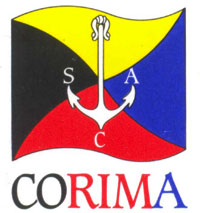
image contributed by Jan Mertens, 17 July 2007
CO.RIM.A. or ‘Societŕ Cooperativa Rimorchiatori
Ancona’ (Cooperative Towage Co., Ancona) is a member of the
Gesmar Group. Modest webpages
concerning this company, based on the Adriatic. Quote from the
‘Our Company’ section: “CO.RIM.A was set up in
1984 to carry out towage services in the port of Ancona and in
Falconara harbour (…and…) provides support to oil
tankers unloading at the (…) A.P.I. refinery in Falconara
harbour, and marine pollution control and remediation
services.” Specifically included are ocean towage and
salvage.
Interestingly the ‘Services’ section is of a general
nature, describing what exactly above and related activities
entail. (The firm seems to operate three out of more
than forty Gesmar Group tugs.).
A good drawing of the house flag found in a Google cache:
quarterly divided clockwise yellow (top), blue (fly), red
(bottom) and black (hoist); a white upright anchor over all,
accompanied by small white serifed initials ‘S’ (left),
‘C’ (bottom, surmounted by the anchor), and
‘A’ (right).
This is a square flag, however the funnel of ‘Conero’
bears a rectangular one.
In any case the use of the 'Z' signal flag is a nice touch as it
means "I require a tug"!
Jan Mertens, 17 July 2007
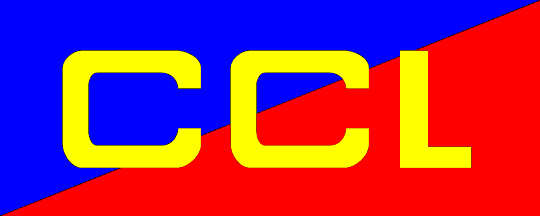
image by Jorge Candeias, 22 April 2002
Costa Containers Lines S. p. A. serves ports in 5 different
geographical areas: South America, Central America,
Canada-Cuba-Mexico, Mediterranean and West Africa. The logo
consists of a rectangular field, divided black over dark red,
diagonally from (if it indeed is a flag) lower hoist to upper
fly, and charged with large yellow initials: CCL.
Source: "Carga e Transportes".
Jorge Candeias, 22 April 2002
The "Costa" shipping company is Italian and has its
head offices in Genoa. One of its divisions is a "Costa
Crociere", known by its trips of pleasure. Other one is
"Costa Container Lines", whose agents in Portugal are
Garland Navegacao Lda.
Aingeru Astui, 22 April 2002
I found the company website at <www.costacontainer.com>.
Aingeru's information is confirmed. I was unable to find a proper
flag, but it seems the red of the logo is a regular red, not the
dark red as appars in the newspaper. I won't recolour my image,
though, until it's proven that it's a proper houseflag and not
just a logo...
Jorge Candeias, 22 April 2002
Viewing the company website I agree that the red is ordinary
but point out that the black is actually blue. Not sure whether
the flag exists but the design appears on the funnel so prospects
are likely. Don't know about the connection with Costa Crociere
S.p.A. as that company is now part of Carnival Corporation and
that group is only involved in cruise shipping.
Neale Rosanoski, 7 January 2004
There is a drawing of the flag at <www.gapgroup.com>.
Jan Mertens, 2 April 2004
Costa Container Lines SpA - Jorge's comment about
not changing the colour from black to blue can now be rectified
as the flag is now proven, not only being flown at sea but in
full display on their
website where it is shown in connection with the company
becoming a subsidiary of Hamburg Süd, with normal proportions,
unlike the logo. It is also shown as being equipment for sky
diving on <www.costacontainer.com>.
Neale Rosanoski, 5 August 2008
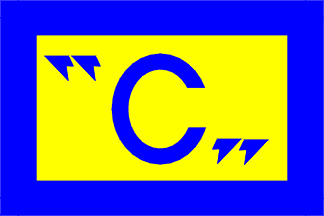
image by Jarig Bakker, 5 January 2006
Costa Crociere S.p.A., Genoa - yellow flag bordered blue, blue
""C"".
Source: Brown's Flags and Funnels Shipping Companies of
the World, compiled by J.L. Loughran, Glasgow, 1995.
Jarig Bakker, 5 January 2006
Costa pennant, yellow
with blue border and blue initial ‘C’ is at <www.partirencroisiere.fr>.
A recent Italian eBay offer showed this pennant, giving
dimensions of the “bandiera gagliardetto” as 0.75 m by
1.20 m. I do not know whether it replaces the house flag shown
above or is used alongside it.
Jan Mertens, 25 May 2008
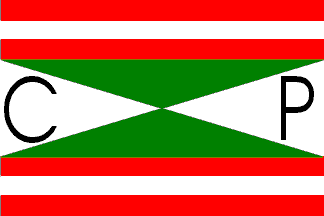
image by Jarig Bakker, 26 October 2003
At home I have a stout "Larousse Commercial
Illustré" (a kind of trade encyclopedia) published in
Paris, 1930. It has four pages in colour illustrating house
flags; a note identifies it as the work of Sandy Hook.
In this book, I found "Cosulich" (Trieste - different
from Fratelli Cosulich - see below): three horizontal stripes,
the upper and lower one themselves horizontally divided
red-white-red, the central one diagonally divided: upper and
lower triangles green, the left and right ones white bearing a
black C and T, respectively. The horizontal division is 4:7:4.
The letters are at the extreme end of their respective triangles,
where they have most space. The two RWR bands on the Cosulich
flag have horizontal divisions. (Funnel: red-white-red, black at
the top).
Jan Mertens, 26 October 2003
This is the same as Fratelli Cosulich. I presume that the
"P" shown in the fly is incorrect as the text mentions
"T", and this version indeed is one I have missed
spotting as it is shown by Brown 1926 who then in 1929 changes
the letter to an "L". "T" is also shown
by the Lloyd Reedereiflaggen cigarette card collection of 1933
but this probably originates from Brown 1926. On the assumption
that "T" signifies Trieste its use is logical whereas
the meaning of "L" is not clear but apart from
Brown 1929 its use is also given by Reid-Corson and Bonsor in
their books on the North Atlantic passenger trade although as the
latter two do not specify where their information originates from
this may not be proper support.
Jan's source does differ from most others though in the basic
format as they show a further white band top and bottom between
the central green-white diagonal quarters and the red bands. See here.
Neale Rosanoski, 3 January 2004
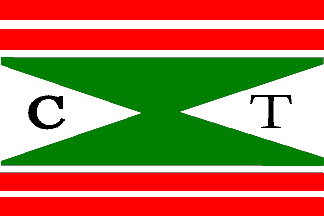
image by Jarig Bakker, 24 January 2005
Soc. Triestina di Nav. "Cosulich", Trieste - top and
bottom two red and two narrow white stripes; green center; at
hoist and fly white triangle charged with black "C" and
"T" respectively.
Source: Brown's Flags and Funnels of British and Foreign
Steamship Companies, compiled by F.J.N. Wedge, Glasgow, 1926 [wed26].
Jarig Bakker, 24 January 2005
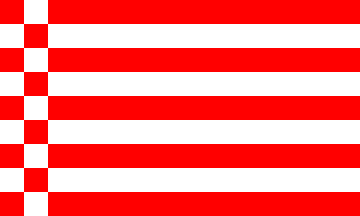
image by Jorge Candeias, 10 Febuary 1999
9 red and yellow horizontal
stripes with two vertical tripes at the hoist in opposite
colour. I'm not sure about the yellow, since the original image
had a black transparent colour, making the flag together with the
background. Please correct if wrong. It's a very Bremen-like flag for an italian company,
isn't it?
Jorge Candeias, 4 Febuary 1999
My impression is that it was red and white.
Al Fisher, 4 Febuary 1999
Following Al's information, I turned the yellow into white.
Now, this is a Bremen flag I find it
weird.
Jorge Candeias, 10 Febuary 1999
The flag can be seen at the company site: <www.cosulich.it>
Dov Gutterman, 20 January 1999
The corrected colors - red and white, are the right
ones. Iti s not Bremen colors but Austrian. Cosulich
started its life as Austro-American under the Habsburgs and only
became Italian by the stroke of a pen in 1919 when Trieste went
to Italy after WWI and Austria lost her seacoast.
Charles Dragonette, 10 July 2000
Originated 1857 and in 1903 formed Societŕ Anonima Unione
Austriaca di Navigizione ,also known as the Austro-Americana
Line, being Austrian at this point. The flag is uncertain being
shown by Lloyds 1904 and 1912 with the hoist similar to the flag
above except the numbers of bands in the hoist "check"
is shown as 12 whilst Reed 1912 only shows 10 and Bonsor in the
North Atlantic Seaway makes no mention at all of this design, with the main field
consisting of 8 narrower horizontal bands in 2 groups of 4 of
red-white in chief and white-red in base with the groups
separated by a wider band taking about 1/3 the flag and
consisting of diagonal quarters of red-white with the white
quarters each bearing a black "A". Again Bonsor varies
by having the two groups each of 3 red and 3 white (and does not
clarify whether the lower group has red on the base or white) and
gives the letters as being red. After WW1 on becoming part of
Italy the company became "Cosulich" Societ? Triestina
di Navigazione in 1919 with a change in the flag with the hoist
"checks" done away with and the central band becoming a
diagonal quarter of green-white with the black letters
becoming "C" and "L". In 1/1932 it was
merged into Italia Flotte Riunite. In 1946 the current company of
Fratelli Cosulich S.p.A. was formed reviving the name and using a
variation of the flag format.
Neale Rosanoski, 11 April 2003
‘Navigare
Magazin’, a site dedicated to Hungarian shipping
(bilingual Hungarian/English) highlighting the pre-Italian past
of Cosulich: “Count Géza Szapáry (1228-1898) was the
Governor of Fiume and the Hungarian-Croatian Littoral between
1873 and 1878. The sailing ship of 593 register tons named after
the governor had been built for the wealthiest Hungarian
shipowner, Casimiro Cosulich, and was launched in 1874 at the
yard of V. Brazzoduro in Pecchine, near Fiume (Rijeka). According
to Annuario Marittimo [Maritime Yearbook, JM] of 1879,
the owners were Casimiro (18/24 share) and Luigi (6/24) Cosulich,
and the bark rigged ship was captained by an other son of
Casimiro, Béla Cosulich.
The ship can be traced in the American and International shipping
registers of 1885 and 1890 with Casimiro as the owner, but
according to the shipping register Annuario Marittimo
Ungherese [Hungarian Maritime Yearbook, JM] the owners are
Maria Mimbelli née Cosulich (Mimbelli was another wealthy ship
owner of the time) and the heirs of Casimiro: Teofilio, Luigi,
Enrico and Amalia Mohovich, born Cosulich. (…)
The last entry in Annuario Marittimo Ungherese of 1905
reads: Sold to Turkish citizen.
The first picture is a painting of the Conte Géza Szapáry by
Bartol Ivankovic dated 1892, showing the ship under full sails in
three views, flying the Austro-Hungarian flag and the signal
letters 'JDHR' on the mizzen mast, the red-white striped Cosulich
banner on the mainmast and the blue flag with the white
insurance number '59' on the foremast.”
The house flag is vertically divided and counting at least three
red stripes and three white ones.
A further riddle is the company name, as all this precedes 1903
when the firm became known as 'S.A. Unione Austriaca di
Navigazione' (a.k.a Austro-Americana Line).
Jan Mertens, 31 March 2008
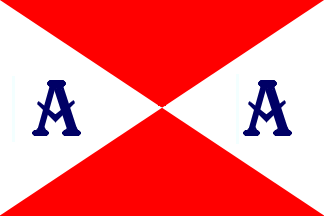
image by Eugene Ipavec, 21 November 2009
Austro-Americana Line: see the poster at <www.classicpix.com>.
The emblem in the lower left corner glorifies the role of Triest
as a port of Austria-Hungary.
Historical information and names of ships on The
Ships Lis.
To begin with there is a Schenker connection (in fact this
logistics firm still exists) as Gottfried Schenker founded
Austro-Americana in 1895. Clickable image of a 1901 poster at
<www.schenker.com.sg>.
The poster was printed at Vienna, home of Schenker & Co., but
really concerns a sea-going route between Trieste and North
America. Five ships are mentioned as well as four agencies in
Austro-Hungary, and four in the United States.
House flag divided
quarterly: red (top, bottom) and white (hoist, fly) and twho
serifed initials ‘A’, one on each white triangle. I
could be mistaken but these
initials seem blue not black. Trieste being situated in
present-day Italy.
Google
Books offers a quote from L. Sondhaus: ‘The naval policy
of Austro-Hungary 1967-1918’. On pp. 189-190 we learn that
A-A was really a joint venture of Austrian and British investors
which, in 1903, took over the Cosulich Brothers company (founded
in 1857). Profiting from massive emigration to North America, the
firm expanded till it operated 35 ships on the eve of WWI and
effectively became the Trieste no. 2 company after
Osterreichischer Lloyd.
Jan Mertens, 12 October 2009
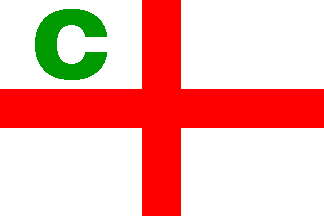
image by Paul, 25 December 2002
Name: "Corrado," Societa di Navigazione.
Circa: early 1950s.
Source: Flags, Funnels and Hull Colours by Colin Stewart
c.1956.
Note: Due to 4-color printing, exact shades are
difficult to determine.
Paul, 25 December 2002
"Corrado" Societŕ di Navigazione. Formed 1927 and
operated until c.mid 1970s.
Neale Rosanoski, 11 April 2003
At the 1940 page at <www.24flotilla.com>:
"Corrado", Genoa - The initial is less rounded here but
this is probably not significant.
Jan Mertens, 5 January 2008
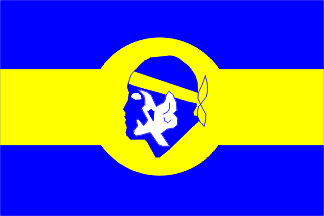
image by Jarig Bakker, 18 November 2005
Corsica Ferries (Italia), S.r.l., Livorno - horizontal triband
of blue and yellow; in center yellow disk, blue moor's head.
Source: Brown's Flags and Funnels Shipping Companies of
the World, compiled by J.L. Loughran, Glasgow, 1995.
Jarig Bakker, 18 November 2005
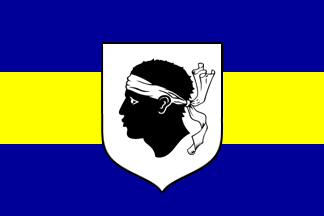
image by Ivan Sarajcic, 9July 2007
According to photo taken on July 5th 2006, at one of Corsica
Ferries vessels, the flag is different from Jarig's report. Flag
has white shield, outlined black charged with moore's head. Photo
at <www.flagid.org>.
Ivan Sarajcic, 9July 2007
A flag, being (Irish!)
eBay item 6635061764 offered by “138chi”, end 11 June
2006.
The original comments was: “This lot comprises an Unknown
Flag Ensign. The flag is of medium size, measuring circa 4 x 2.5
feet and is in very good used condition. This is a genuine well
produced flag and judging by the central device, is probably from
a waring faction in Africa (???).”
Jan Mertens, 9July 2007